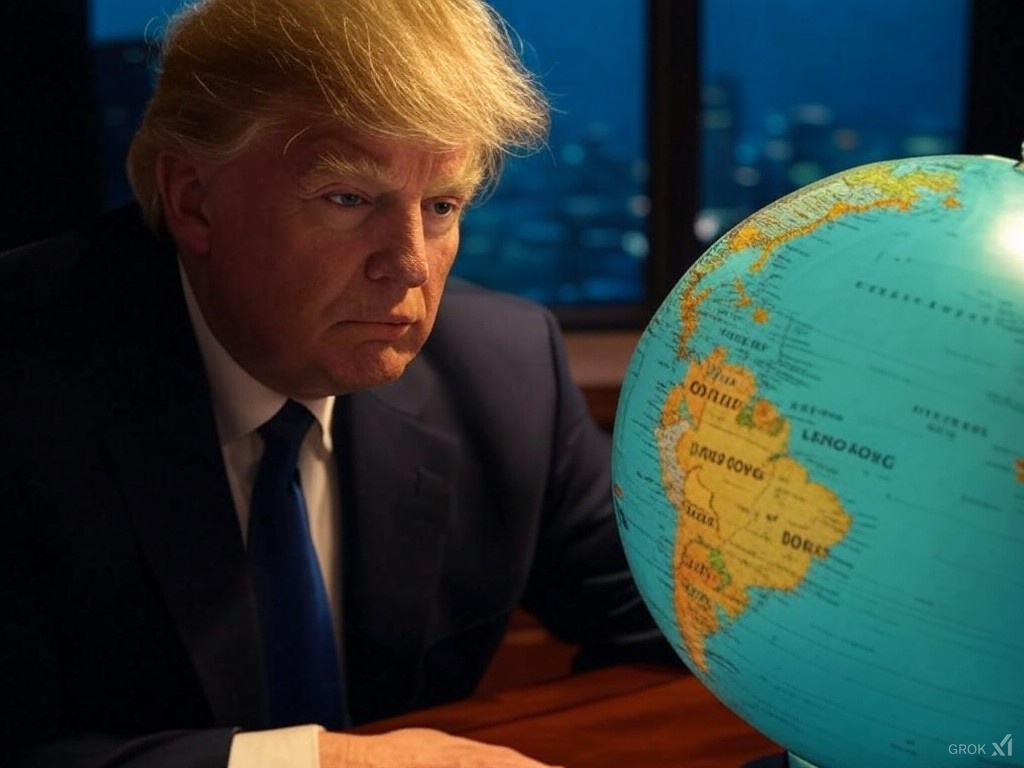One of the most mercurial and unpredictable politicians of our time has reclaimed the mantle as leader of the free world.
But Donald Trump doesn’t seem all that interested in “free” — at least not in the global sense. His focus is making America “great again.” And part of that means turning it into the crypto capital of the world.
‘Merica’s is the world’s biggest economy by a mile, and with the dollar reigning as the global reserve currency, Trump’s crypto aspirations are no pipe dream.
But the competition is scrappy and swift — and it hasn’t been waiting around.
The EU has a head start with its rules for crypto, and may seem like a natural rival to Uncle Sam. But it’s places like Dubai, Hong Kong and Singapore that are truly flexing their crypto credentials.
Read more: Hong Kong’s putting crypto in the fast lane
While the US was choking the crypto ecosystem under the outgoing president, Joe Biden, they brought in clearer, if not entirely favorable, regulations and are courting businesses with promises of innovation and policy clarity.
The wannabes
While the US SEC faced criticism for its lack of guidance, Dubai set the pace for crypto in 2023 with clear regulations and a fast-tracked licensing process, attracting major players like Binance, OKX and Crypto.com. There is even a 17-story crypto tower in the works.
The capital of the UAE, Abu Dhabi, also approved Tether’s USDT, the largest stablecoin, in under a week after bringing in a framework for these tokens.
It even brought Eric Trump to a Bitcoin conference, where he made a million-dollar Bitcoin prediction.
Singapore and Hong Kong have been engaged in some competition of their own, leading the charts around blockchain friendliness and adoption –– and racing each other to give approvals at lightning speed.
Singapore approved a stablecoin license application from Paxos (think PayPal stablecoin) and allowed Southeast Asia’s super-app, Grab, to accept certain crypto payments. The central bank also eased crypto investing qualifications.
Hong Kong’s been slightly behind but appears to have turned things around by introducing a “swift” process for licensing just last week. This was after it had already announced plans to scrap taxes on crypto gains for hedge funds.
Closer to the US, El Salvador has cast itself as a crypto utopia, making it mandatory for businesses to accept BTC payments.
Is it working?
These hubs, and to some extent London, have all voiced different versions of ambitions to be regional or global crypto hubs in the time the US sort of ceded its leadership in the space.
And it is working… to an extent. An exodus of crypto entities from the US has been evident in the Biden era.
Under pressure from US regulators and complaining about a lack of clarity, big crypto names like Coinbase put one foot out of the door by setting up shop in Bermuda.
Gemini sought a license in the UAE and Ripple too threatened to leave the US if it lost its case against the SEC.
Add the influx of leaders and traders gravitating to these crypto-friendly hubs offering clarity — instead of regulatory limbo or federal scrutiny — and it’s clear that is more than a trend.
But if the US muscles back in?
With Trump back in the driver’s seat, even with the latest memecoin distraction, the global crypto narrative could shift.
But how does this impact the hubs that have been punching above their weights? Do they compete within themselves for the leftovers? Or will the rising tide lift all boats?
It’s not all doom and gloom for these up-and-comers, says Hassan Ahmed, the Singapore director at Coinbase. While some funds may flow back to the US, it’s a chance for Asia-based projects to expand stateside — but overall, it’ll be a real “level up” for the industry.
Trump’s return and the promise of the US getting back into the game has already seen crypto getting a renewed lease of life in Morocco, Bhutan, Thailand, the Philippines, Botswana and other places.
Some argue that competition from the US will force these hubs to sharpen their game.
Former UK MP and crypto policy leader Lisa Cameron tells MONIIFY that other sovereign players in crypto will want to “collaborate with the fast-paced progress expected within the US.”
Equally, they will have to work quickly to “ensure their jurisdictions keep pace and are not left behind,” Cameron says.
This is echoed by Dilip Chenoy, chairperson of India’s crypto advocacy group, Bharat Web3 Association. He says that this “challenge” will push regions to “refine their” own rules to keep up.
India, which remains an enigma with harsh taxes and no clear crypto laws, risks losing talent if it doesn’t act, warns Chenoy.
“It’s a good push for policy competition… adoption will grow globally,” says Henry Zhang, a former StanChart and Citi banker turned crypto founder in Singapore.
Read more: WazirX has found and frozen $3 million of stolen crypto
Not everyone’s buying it
For all the hype, skeptics remain.
“There’s still some mistrust around the US and its crypto future,” says Angelina Kwan, CEO of Stratford Finance, suggesting that many firms and people won’t be quick to reverse their offshore moves.
Living standards, lower taxes and streamlined processes are reasons why crypto players flocked to these hubs in the first place, says Danny Chong, co-chair of the Singapore-based Digital Assets Association. Trump’s return doesn’t magically erase those advantages.
But Trump does share a common trait with crypto: volatility.
Whether his return to power shakes up the global crypto landscape or just adds more noise to the ecosystem, one thing’s for sure — the stakes are higher than ever.
Edited by Ankush Chibber. If you have any tips, ideas or feedback, please get in touch: talk-to-us@moniify.com






